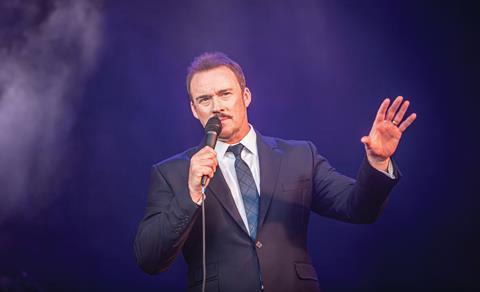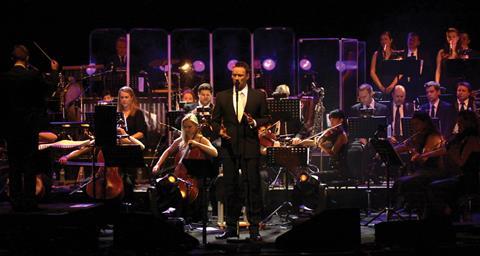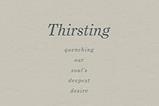The world-renowned tenor explains how a near-death experience led him to faith, and why he’ll never tire of bringing joy to others through his music
Russell Watson was in his mid-20s when he was “plucked from obscurity” and thrust into the spotlight. He never planned to be a recording artist, instead dreaming of football stardom as a young boy. “It was daydreams really. I was never any good,” he confesses. His rise to fame saw him move from imitating crooners in backstreet pubs and clubs to belting out classical hits and musical theatre favourites at stadiums and concert halls around the world. The unexpected invitations to sing for the Pope, the late Queen Elizabeth II and two US presidents are what has made his career so exciting, he says.
Today, Watson is one the UK’s bestselling classical artists. He has sold 7 million albums, won multiple BRIT awards and worked with musical legends including Paul McCartney and Luciano Pavarotti. Yet at the height of his fame, he came close to death. Brain tumours caused the then 40-year-old to suffer a brain hemorrhage while lying in bed one night, resulting in emergency surgery. These events rocked his world – and cemented his faith.
The singer did not grow up in a churchgoing home, but credits his parents with raising him “in a very Christian way, to believe in honesty and integrity and to be a good person”. He first learned about the Christian faith at school, but it was not until his grandparents died that he began to ask more serious questions about the meaning of life.
Faith gave me strength during a very difficult period
When his health hit a crisis point, he finally moved beyond belief in “a god” and living by “Christian values” to an active faith. “That was where I really began to pray hard, for the first time in my life,” he says.
Watson’s faith journey has not been straightforward. Being a Christian in the entertainment industry isn’t easy, he tells me, and despite a powerful near-death experience which helped convince him there’s more to life than what we see, he still has doubts regarding the afterlife. “I still fear death,” he admits, before adding that better teaching on what the Bible says about dying and more honest conversations about death would “help massively”.
Today, he credits his brush with mortality, and his Christian faith, with bringing a sense of balance that was too often missing in the early days of his career. Accepting his limitations, prioritising time with his family and using his musical gift to bring joy to others is what makes the singer really come alive these days.
At the height of your career, you suffered from two brain tumours, one of which resulted in a near-death experience. How did it affect your faith?
When I was struck by the first tumour, I was petrified. I knew I needed an operation, but I was very frightened, so I did a lot of praying. Then it struck for the second time.
When you’re looking your own mortality in the face, you can either go: “Well, I don’t believe in this anymore. Why is this happening to me?” Or you can take your faith and use it. My belief in God, and in the fact that I was still here for a reason, was [how] I was able to continue with my life. Faith gave me strength during that very difficult period.
Did your outlook on life change after your brain tumour?
As we progress in age, and experience more deaths, we see mortality very differently. In this country, post-life is something that is, in many respects, a taboo subject, and it shouldn’t be really…It’s a morbid subject, but we should give it consideration because it’s a real thing. There’s nothing more certain in life than death. To plan for that as well as you can saves those you love a great deal of stress.
Do you have the hymns that you want sung at your funeral planned out?
I have everything planned out. But I’m not telling you because I want there to be a few surprises! I don’t want everything to be serious and morose. I want there to be some laughter.
Yes, because as Christians we have the hope of life after death as well, so it isn’t something we should necessarily fear or feel sad about…
I think that if anyone is 100 per cent confident that there is something after life, you can probably roll through life without any fear of death whatsoever. I would like to believe that there is something, however, I’m not in the position – certainly not at this moment in time – where I feel implicitly that there is. I’m just being honest with you.
I would love nothing more than for there to be an afterlife. I feel I’ve been a good Christian and, when the day comes, I’d like to think I would be heading [to heaven] rather than the other place. But I don’t feel 100 per cent certain and because of that, I still fear death.
I had this visualisation where I was on the cusp of death…It was like I had left my body
Would it help if we had better conversations about death, and what the Bible says about it?
I think so. The conversations that we have about post-life would help massively.
I do believe that there is a God, and a heaven and a hell. But that fear still exists within me, and it did for a long time, even after my [near-death] experience in the MRI scanner.
I literally had this visualisation where I was on the cusp of death. The clatter of everything – the noise [of the MRI] and the pain that I was feeling from the haemorrhage – just disappeared. It was like I had left my body. I was in this dark room and there was a door with a slither of light down the side, slightly ajar. I remember thinking that if I walked through that door, I would leave this world. I began to think about my children and how they would manage without me. I thought: I do not want to go through that door yet. All of a sudden, the clatter of the MRI scanner and the pain in my head came back and I was back in the room.

How did that experience affect you?
I had a serious bout of PTSD after [the brain haemorrage]. I went to bed in my own home one night, and I didn’t wake up the next day. I was unconscious. I was put in the back of an ambulance and rushed to hospital for emergency surgery. So for a long, long time afterwards, I would go to bed every night thinking that I wasn’t going to wake up in the morning. My biggest fear isn’t necessarily dying, it’s not seeing the people that I love again.
Does prayer help with those feelings?
I pray for everyone that I love. Simple as that. I pray for my kids, I pray for my wife. If I see something on the news or on social media, I’ll pray.
Is it difficult to be a Christian in the entertainment industry?
Yeah. Because there are so many people that don’t behave in a Christian manner. It’s a very tough industry where, dare I say, there are many untruths spoken. You have to get used to that.
You can’t please everyone, and you can’t do everything. Once you’ve accepted that, your life becomes so much more gratifying. In the early stages of my career, I found it difficult to say no, which meant I was away from home, and not seeing the people that I loved the most as much as I should have. It became all-consuming. It wasn’t good, and I didn’t enjoy it.
How do you make sure you keep that sense of balance now?
By saying no to things that I don’t want to do, and strategically planning my diary. I want to spend time with my wife. My children are grown up now, but at least once or twice a week, we go for coffee or shopping or a walk. When I went through my illness, they went through it with me. It’s made our relationship even stronger. I couldn’t imagine doing what I did back in the early stages of my career again.
Have you ever been on the sharp end of some of those more nefarious elements of the music industry?
Yeah, loads. In many respects, I’d rather forget them. But what counts is learning from it. There are some fantastic people in the music industry, but there are certainly dishonest people out there. They know who they are. You’ve got very experienced industry people who are used to dealing with agents, promoters and record labels, and you’ve got young kids coming into the industry with zero knowledge whatsoever.
I like to think I’d be heading to heaven, but I don’t feel 100 per cent certain
Shane Lynch recently told us that he considered the music industry to be demonic, and that he had seen albums prayed over demonically. Have you ever seen anything like that?
No, I haven’t. There have been times when I’ve thought: What a horrific business! But demonic? I’m not so sure about that.
Would you consider your musical talents to be a gift from God?
Yeah, without question. And a gift that I discovered later in my life. Thank God that I did! But yes, I do 100 per cent consider it to be a gift.

In an interview with The Times in 2007, you said you wanted “to be a musical force for good”. What did you mean by that?
It doesn’t matter where I am, if there’s any happiness to be spread, and I have an opportunity to do it, then I’m happy to. My daughter works at a care home, in the dementia ward. A few weeks ago, she said: “They’ve asked if you’d come in and say hello.” Straightaway, I said: “Yes!” I didn’t have to think about it, because it was an opportunity to bring some happiness to people. Somebody asked me to sing ‘Jerusalem’ and they were all singing along. All I could see was these smiling faces. I literally ended up with tears rolling down my face.
What better thing in life can you bring than happiness to other humans? It doesn’t matter whether it’s 92,000 people in a stadium or 90 people in a care home. The smiles on the faces and the responses to what I do when I sing – that, for me, is the payback.
If you could ask Jesus one question, what would it be?
That’s a tough one. It’s a toss-up between: What does the future hold for humanity? And: Is there a heaven?
That’s technically two questions, but I’ll let you off! Do you have a favourite Bible story or passage?
There are so many! My friend and I exchange them pretty much every Sunday. Here’s one he sent me recently: “Don’t waste your time on useless work, mere busywork, the barren pursuits of darkness. Expose these things for the sham they are. It’s a scandal when people waste their lives on things they must do in the darkness where no one will see. Rip the cover off those frauds and see how attractive they look in the light of Christ. Wake up from your sleep, Climb out of your coffins; Christ will show you the light! So watch your step. Use your head. Make the most of every chance you get” (Ephesians 5:11-16, The Message).

There’s another one he sent me that wasn’t from the Bible, but was written by Charles Spurgeon: “The more grace we have, the less we shall think of ourselves, for grace, like light, reveals our impurity.” I like that.
To hear the full interview listen to Premier Christian Radio at 8pm on Saturday 23 December or download The Profile podcast premier.plus/theprofile






































No comments yet